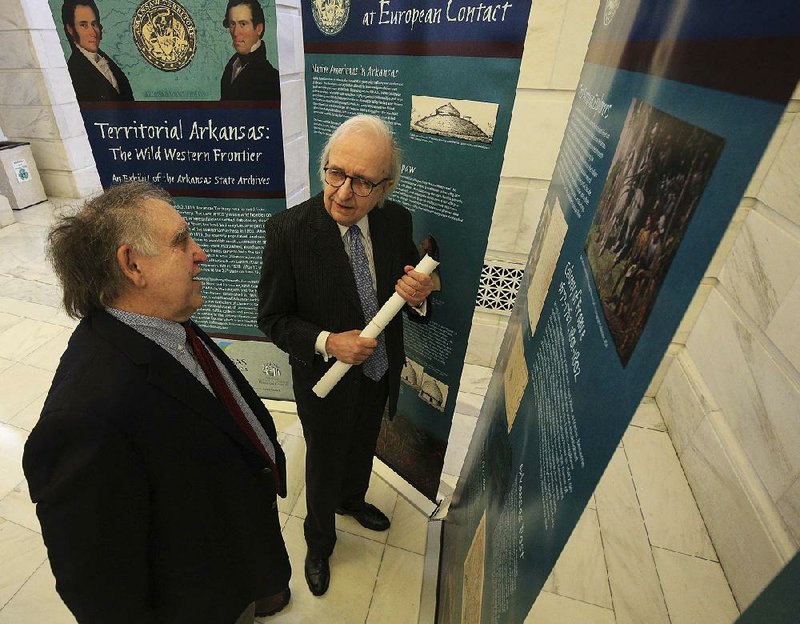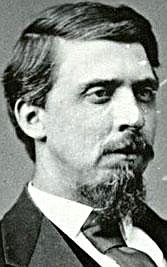Roughly 60 years ago, a man with a passion for the past put self aside, reaching into a fire to save records that once belonged to one of the best-known judges in American history.
The documents of Judge Isaac Charles Parker, better known as "the hanging judge," recently were acquired by Arkansas.
The acquisition was revealed Friday during an event in the state Capitol rotunda regarding the bicentennial of the formation of the Arkansas territory. Arkansas was established as a territory on March 2, 1819, and became a state in 1836.
Gov. Asa Hutchinson told the crowd that Arkansas was replete with "bigger-than-life" characters during a "rough and tumble" time in the state.
"One of those characters that really reflected the roughness of Arkansas and its history was Judge Isaac Parker," Hutchinson said.
Parker, who served as a federal judge for the Western District of Arkansas in Fort Smith from 1875 to 1889, had jurisdiction over 74,000 square miles of what was known as "Indian Territory."
During his tenure, Parker tried 13,490 cases, with 9,454 of them resulting in guilty pleas or convictions, according to the Encyclopedia of Arkansas History & Culture website. Parker sentenced 160 people to death, often by hanging -- earning him the reputation as "the hanging judge." He died in 1896.
"Judge Parker left a trove of records that tell the story of his time," Hutchinson said.
The collection, which contains about 6,000 pieces and was appraised as $477,665 in value, was bought by the state for $314,500, said Department of Heritage spokesman Scarlet Sims.
The purchase was funded by a grant from the Arkansas Natural and Cultural Resources Council, which will pay $157,000 this year and the remainder in 2020.
"Each year, [Arkansas Natural and Cultural Resources Council] grant money is earmarked for historically significant Arkansas artifacts in need of conservation, and this collection certainly fits that criteria," Sims said. The grants are funded by revenue from real estate transfer taxes.
The collection was acquired from the sons of the late William Fadjo Cravens of Fort Smith, a former congressman, lawyer and Fort Smith banker who passed away in 2012. His grandfather, William Murphy Cravens, had been a defense attorney in Parker's court in the mid-1800s.
In the late 1950s, Fadjo Cravens, an amateur historian, was working with a small group of people to preserve historic records from the Western District of Arkansas when someone arrived at his office to say that the city clerk was burning records that had been housed in the old courthouse. That structure had been demolished to make way for a new facility.
"My dad ran back to the courthouse and was pulling the records out of the fire," David Cravens, one of the sons, said. "He asked, 'Can I have these?' and they said, 'Yeah, that's fine.'"
Fadjo Cravens kept the records in a filing cabinet at his home for several years in a climate-controlled room.
"They did nobody any good to be in our possession," John Cravens, another son, said. "One of the things that we were very focused on with the state was making sure it was shared with the [U.S.] Marshals Museum and other Arkansas-related causes."
The museum is scheduled to open in the fall.
David Cravens said he didn't realize the significance of the collection as a child, but knew they were special by his father's admonishments that touching the papers too frequently would cause them to deteriorate.
"They were in great shape," David Cravens said of the documents.
About a year ago, family members decided to find a permanent home for the collection. They called their father's longtime friend, Swannee Bennett, director of the Historic Arkansas Museum in Little Rock. Bennett pointed the family to the Arkansas State Archives.
Wendy Richter, director of the State Archives, said the collection is a very significant acquisition for the archives. While the records themselves seem like ordinary, everyday things, they "tell us about the Western frontier," Richter said.
Travel vouchers by deputy marshals are contained in the collection and offer vivid descriptions of their surroundings and the people they interacted with, Richter said.
Stacy Hurst, director of the Department of Arkansas Heritage, the agency over the archives, said the State Archives has been organizing the collection and will soon begin digitizing them.
Richter said the digitization project should be completely online by midsummer.
The documents will be accessible on the archives database that is searchable for free online at archives.arkansas.gov/research/search-records.aspx.
"It's almost like a journal," Richter said of the documents. "The deputies tell, in detail, they had lunch with so-and-so in this town, where they stayed, what they did. Someone who is willing to really delve into them will get a lot of rich information. Once we digitize them, they'll even be able to track a certain marshal through his life. They can just follow along from one document to the next and see what they're doing. They can just put in the marshal's name and follow them."
The original documents are stored at the State Archives in Little Rock and are available now for public viewing.
"It is a fascinating collection that tells an interesting story of early Arkansas," Hurst said. "I think that they are documents that will be well used, not just by Arkansans, but they will hold interest for people throughout the country."
"Historians, writers and, who knows, moviemakers will want to access these papers," Hutchinson said.
John Cravens said family members decided they could not adequately preserve and care for the collection on their own. He is excited, he said, about viewing the collection online once it is digitized and seeing it permanently preserved.
"This place can take care of it for eternity, as long as there are people around," he said.
A Section on 03/02/2019

